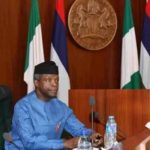Vice-President Yemi Osinbajo on Monday said the present administration had so far provided interest-free loans totalling N15.183bn to over 300,000 beneficiaries across the country.
He said the beneficiaries included traders, artisans and farmers.
Osinbajo spoke at the 9th Presidential Quarterly Business Forum held at the old Banquet Hall of the Presidential Villa, Abuja.
He said each of the beneficiaries got between N50,000 and N350,000 under the scheme.
Osinbajo expressed the belief that the present administration would make a massive difference if N1tn was spent on the poor yearly.
He stated, “A total of N15.183bn in interest-free loans ranging from N50,000 to N350,000 has been disbursed to more than 300,000 market women, traders, artisans and farmers across all 36 states of the country and the FCT. By the way, 56 per cent of the loans have gone to women.
“We took the view that since the largest number of small businesses in Nigeria are the market women and men and petty traders, we needed to expand the opportunities in these categories.”
Osinbajo said the government’s focus had been to ensure that regulators understood their role as facilitators and not obstacles to business.
As a way of achieving this, he explained that the government was also establishing one-stop shops where all regulators would be under the same roof in the states.
“If we spend N1tn to bail out the poor in this country every year, we will make a massive difference,” he stated.
The Vice-President also said the government was working hard through the Presidential Enabling Business Environment Council to improve the business environment.
He added that the government had expanded the micro credit scheme to small businesses under the Government Empowerment and Enterprise Programme.
Osinbajo described the Trader Moni scheme as one of the crucial components of expanding opportunity for millions of Nigerian traders by giving micro-credit to the bottom of the trading pyramid.
According to him, the government has empowered two million petty traders under the scheme, giving microcredit across the country.
He said, “By giving them credit to replenish and increase their inventories, we give them a stronger chance to earn more, while they also service the value chain that they are a part of. But more importantly, we bring them into the formal sector, where they have access to government and private credit, and we lift more people permanently out of poverty.
“An important feature of the programme is financial inclusion. The GEEP has led to the opening of 349,000 new bank accounts/wallets for beneficiaries and intending beneficiaries.”
Osinbajo described owners of small businesses as the largest segment of the working population.
He said although their inventory was between N5,000 and N10,000, they were important parts of the value chain of most goods.
He added, “They sell the single sachets of soap, sugar and spices to the largest numbers of our people. But they are forgotten and ignored in economic plans and budgets, and considered too unwieldy and risky for micro credit loans.”



